
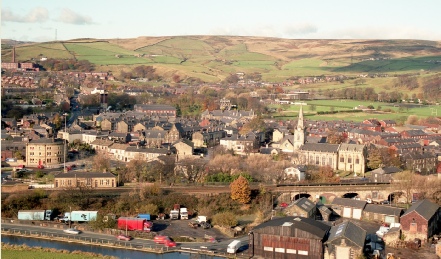
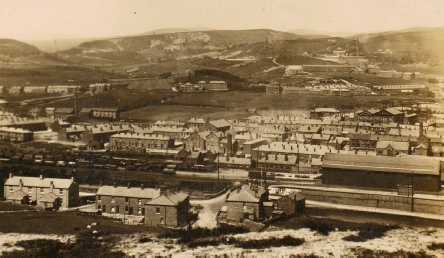
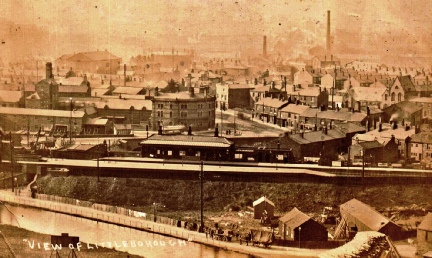
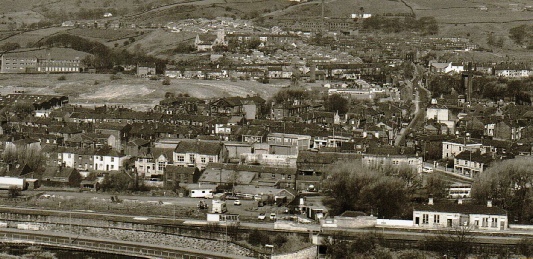


Farming in Littleborough by Dr John Lingard
Agricultural Economist ex Newcastle University - April 2025
HISTORICALLY UK has had a CHEAP FOOD POLICY reliant on Food Imports
Exception 15TH Century CORN LAWS (tariffs), REPEALED 1846.
COBDEN & BRIGHT, the MANCHESTER FREE TRADE SCHOOL
FREE TRADE kept Food Prices Low, Low Wages made Industry Competitive.
2ND WORLD WAR 1939-45
Threatened Food Security as German U boats hit grain ships.
REDUCED FOOD IMPORTS, FOOD RATIONING, DIG for BRITAIN, LANDGIRLS
FARMING in LITTLEBOROUGH 1950
Unfavourable Farming Environment – wet, hilly, heavy soils.
Estimated 50+ Small Family Farms in Littleborough using traditional methods.
Size - 25 to 60 acres,
6 to 15 DAIRY COWS (Shorthorns/Ayrshires),
4 to 8 Calves and Followers/Stirks
2 to 4 SOWS (Large Whites), 8 to 14 PORKERS,
200 LAYING HENS (Leghorns, Sussex and RIR)
A few hill farms had Sheep (Lonks and Gritstones)
Low Yields – 400 - 650 gallons milk per cow, 120 - 150 eggs per hen
Tractors but some (5+) still had Horses – Milk Rounds, Producer - Retailers.
Hay Making - mowers, shakers, side delivery rake; chain harrows, muck spreaders
Milking machines but some still hand milking
Labour Intensive relying on manual family labour but a few hired workers.
1947 AGRICULTURE ACT - to promote a stable and efficient industry.
ANNUAL PRICE REVIEW between NFU’s and GOVT fixed GUARANTEED PRICES announced in advance supported by DEFICIENCY PAYMENTS
INPUT SUBSIDIES & GRANTS to speed up TECHNICAL CHANGE and adoption of IMPROVED FARMING PRACTICES
1. subsidies on inorganic fertilisers ( N & P),
2. farm improvement grants - drainage, lime, buildings
3. depreciation allowances against tax for investment in farm machinery and equipment;
4. publicly funded advisory service
5. experimental husbandry farms, agricultural education, agricultural research institutes.
AIM to KICK-START the INDUSTRY from :-
1. Labour - Intensive, Low Productivity, Organic.
2. Capital- Intensive, High Productivity, Chemical- Using.
Littleborough Farms Responded To The 1947 Act.
Used inorganic fertilisers, improved genetic potential of animals, Artificial Insemination, high yielding Black and White Friesian Cows (1000+ galls/yr), Thornbers (Mytholmroyd) hybrid poultry (320 eggs/yr), Battery cages, Broilers and Turkeys, Balers introduced 1960 speeded up haymaking,
Food Rationing ended 1954.
1960s period of dynamic change in local farming – increased productivity and profitability.
Rochdale Agric Discussion Society
Rochdale Young Farmers Club
Rochdale Observer – Livestock for Sale Column, Farm Dispersal Sale adverts
Rochdale Agricultural Show on Lenny Barn
Livestock Markets – Haslingden and Stacksteads, Bacup
Slaughterhouses (2)
Knackersyard on Dyehouse Lane
Animal Feed Suppliers – Mallinsons (Cornholme), BOCM, Bibby’s, Spillers
Egg Marketing Board - packhouses – Lion symbol stamped on tested eggs.
Milk recording.
Daily Milk churn collection by MMB lorries, later bulk milk tankers but access problems for small farms.
Period of prosperity despite losses of land to Housing
eg Calliards farm vanished as did Cleggswood Hey, Fielden’s land between Little Clegg & Milnrow rd, Bents farm, Stubley.
ADVERTISING
“Drinka Pinta Milka Day”
“Go to work on an Egg”
New technology – milking parlours, cubicles, slatted floors, slurry disposal systems, electronic out-of parlour feeding but mainly suitable for large farms – Littleborough missed out.
Late 1970s UK Milk Supply > Demand - Surplus Production.
Butter Mountains in EEC which UK had joined in 1973.
Falling milk prices
Much low-value milk being diverted to manufacturing.
PRODUCTION QUOTAS introduced APRIL 1984 to attempt to achieve market balance. Set at 1983 DELIVERIES minus 9% for UK FARMS.
By late 1970s many high-cost, small dairy farmers in Littleborough had exited the industry.
Few full-time commercial farmers remain.
Average Herd Size UK 2024 was 219 milking cows.
Need to retain a Green Environment around Littleborough to provide landscape, amenity, habitats for flora and fauna, recreation given possible further land losses to housing.
CONCLUSION
Farms played an important part in helping Littleborough recover from the War providing local foodstuffs at time of shortages but Production Agriculture on any scale is unlikely to return.
UK Milk Production and Consumption 2020
Dairy Herd 1.85 million cows
Average Yield 8,200 litres per annum
Production 15,300 million litres
Imports 701
Exports 1046
Consumption
Liquid 6254
Butter 398
Cheese 4620
Cream 333
Yogurt 531
Condensed Milk 351
SMP 888
Other 625
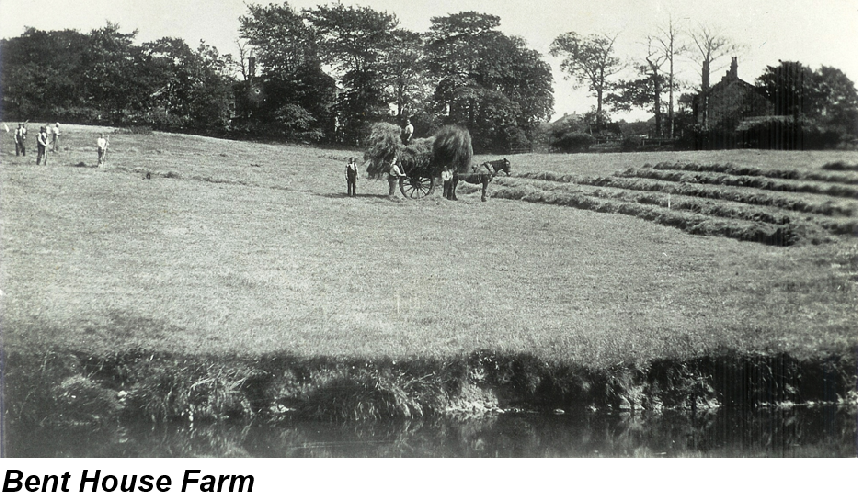


ABOVE - Haymakers at Bent House farm
BELOW - Barn, farmer and workers and horse at Higher Windy Bank Farm


Dicky Steps Farm

LEFT
Unique circular staircase at Windy Hill Farm
| Contact Us |
| Rechabites |
| Early Schools |
| Non-conformist schools |
| C of E and RC Schools |
| Board and Local Authority Schools |
| Richard Jay - Coach Operator |
| William Burrill |
| Richard Jay Haukier |
| Leach - Cycles to Haulage |
| H M Sutcliffe |
| J Grindrod & Son Ltd |
| R Rudge and Son Ltd |
| Canal Restoration |
| Clegg Hall & Smithy Bridge |
| Railways in Littleborough Centre |
| Littleborough Viaduct to Summit Tunnel |
| Summit Tunnel |
| Industrial Railways |
| Blackstone Edge Turnpike |
| Calderbrook Turnpike |
| Doghill to Steanor Bottom Turnpike |
| Todmorden Rd TP |
| Toll Roads |
| Farming |
| list of Farm |
| Industrial Histories |
| History Trails |
| Littleborough Book |
| Pubs & Inns |
| Co-op - Early Grpwth |
| Coop - Central Premises & Competition |
| Coop in 20th Century |
| Coop Decline & Change |
| LANCTAN |
| Schofield Iron Woks |
| Phoenix Iron Works |
| Clegg's Shore Mills |
| Consterdine textile Mills |
| Schofield Textile Mills |
| Rayon (Artificial Silk( Manufacture |
| Mills |
| Deanhead Chemical Works |
| Akzo Chemical Works |
| Starring Pottery |
| Summit Brickworks |
| Tetlows Pottery |
| Whittaker Pottery |
| Coal Mining Map |
| Starring Clay and Coal Mine |
| Cleggswood Colliery |
| Mining around Hollingworth |
| Shackleton - Coal Merchant |
| Possible Roman Littleborough |
| Blackstone Edge Roman Road |
| Roll of Honour |
| WW2 Heroes |